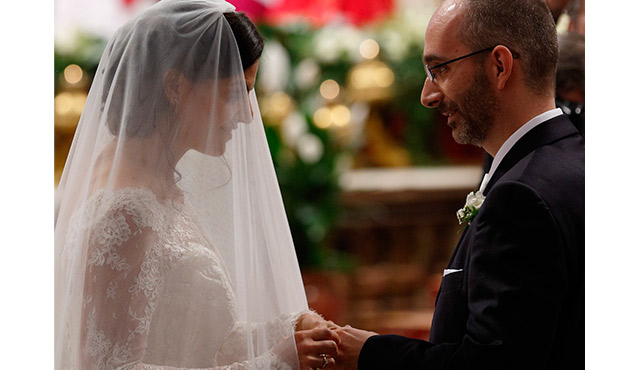FORT WASHINGTON, Md. (CNS) — Marriage is not only a social good, but an economic one as well, said speakers on a recent panel on “The Future of Marriage in America.”
“Good marriages truly lead to a flourishing society,” said moderator Kate Bryan, communications director for the American Principles Project.
It is “statistically proven that children do best” in a traditional, two-parent household, said Wade Horn, who served as assistant secretary for children and families in the Department of Health and Human Services under President George W. Bush.
“What we’re finding out now is that kids who are born and reared in two-parent households are more likely to move up on the income scale as they become adults,” he said.
Social mobility is “something that researchers are paying attention to,” Horn added, “but what I’m not sure if policy groups are paying attention to is the fact that marriage matters.”
Horn and others on the panel spoke Feb. 26 during the Conservative Political Action Conference, held at a convention center in a Maryland suburb of Washington.
“A good marriage culture is a concern to those who want a just society, good government and a stable economy,” said Jennifer Marshall of the Heritage Foundation.
Children need their mothers and fathers and no government program can substitute for the love, guidance and sense of place in the world that parents can provide, according to Heather MacDonald, a fellow at the Manhattan Institute for Policy Research.
A changing marriage culture in the United States is proving toxic for both young men and women, she said. “What we’re seeing now in the inner city is catastrophic; marriage has all but disappeared.”
According to the latest U.S. Census statistics, by the end of 2013, single-mother families in poverty had increased for the fourth straight year to 4.1 million, or 41.5 percent. That number corresponded with longer-term trends of declining marriage and out-of-wedlock births. Census figures showed that the number of married couples with families living in poverty remained unchanged at 2.1 million, or 8.7 percent.
“Young boys are growing up with no expectation that they will marry the mother of their children because now single parenting is absolutely the norm,” said MacDonald. “Children in cultures where marriage has disappeared are not being inducted into a culture of stability and responsibility … so you have a spiraling system of dysfunction.”
“Raising your own child is the most important lesson of personal responsibility that a young male can learn; when that is taken off the table, you have a recipe for anarchy,” she added.
The panel also addressed the trend of “delayed marriage,” or getting married later in life, which MacDonald said “is now a challenge for our culture.”
She attributed the growing trend to “the feminist movement and recalibrating relationships between men and women in the wake of that.”
She also described a “gap between desire and reality.”
“As long as pollsters have been asking questions, young people have been saying that happy marriages and family life are important to their future,” she said, yet the median age of those marrying in the United States has increased six years in the past four decades.
The cohabitation of unmarried couples has “increased tenfold since the Sixties,” said MacDonald.
She also said that males are increasingly viewed as “basically extraneous” and many see fatherhood as optional to family life.
Horn agreed, saying that “when we lose the idea of fatherhood, then we lose fathers.”
He recalled his work with the Healthy Marriage Initiative, created by Congress in 2005 “to help couples, who have chosen marriage for themselves, gain greater access to marriage education services, on a voluntary basis, where they can acquire the skills and knowledge necessary to form and sustain a healthy marriage.”
The program provided both premarital education and marriage-strengthening services to low-income couples.
“We saw lasting impacts after only a short-term intervention,” said Horn, who stressed the need for providing greater access to marriage resources and conducting public education campaigns on the importance of marriage.
In a February interview with Catholic News Service for National Marriage Week, Robert P. George echoed the panelists’ view that flourishing societies depend on the traditional institution of marriage.
“All other institutions of a society — economic, civic and legal — vitally depend on marriage,” said George, a Catholic, who is a professor of jurisprudence at Princeton University.
“They rely on people being decent, law-abiding citizens who are willing to do their part for the common good,” he said, “so they depend on the institution of marriage because they (society’s institutions) require the kinds of people that they themselves are not able to generate.”

